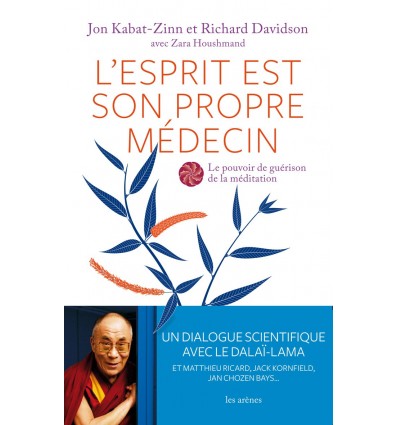Humanism • Spirituality • Well-being
-
0
Product
Products
No products
To be determined
Shipping
0,00 €
Total
Prices are tax included
Product successfully added to your shopping cart
Quantity
Total
There are 0 items in your cart. There is 1 item in your cart.
Total products
(tax incl.)
Total shipping (tax incl.)
To be determined
L’esprit est son propre médecin
LE POUVOIR DE GUERISON DE LA MEDITATION
Meditation has a positive effect on physical and mental health: this is now a proven scientific fact. Current research therefore focusses on the clinical applications of meditation and particularly: can we relieve pain with meditation? Can we influence the outcome of a physical illness with meditation? How can we improve our emotional state through meditation?
1 Item
In stock Delivery 2 to 4 days
Description
More and more scientists are investigating meditation, and particularly its effects of health. For over a decade, a group of researchers in the fields of medicine, psychology and neuroscience came together with the Dalai-Lama and practitioners of different forms of meditation. These meetings focused on a fundamental issue: science and the clinical applications of meditation. Essential questions were raised within the context of these reflections: What effect can meditation have on pain and suffering? Can our mind really influence the outcome of a physical illness? How can we nourish and keep our minds in shape? How can we achieve an improved emotional balance in our lives? On the basis of numerous investigations, it appears that meditation has a positive effect on physical and mental health. It enables stress relief, as well as a drop in relapse rates in cases of chronic depression. It also has a beneficial effect on the treatment of cardio-vascular and immune diseases, as well as in pain relief. This book concludes with a presentation of the most significant discoveries of recent years concerning meditative practice. Its reading has convinced us of the healing power of meditation, and therefore of the role which it can play in the evolution of healthcare. The alignment of science and spirituality yields huge potential. TABLE OF CONTENTS• The clinical applications of meditation: science, practice and implementation: How the practice of Buddhist meditation can contribute to our understanding of pain and suffering - The potential for healing - Easing suffering - The profound nature of the human mind and body (Ajahn Amaro) - Certain clinical applications of mindful meditation in medicine and psychiatry: cases of stress relief through mindfulness (Jon Kabat-Zinn) - Body-mind-spirit interaction and meditation (Richard Davidson)• The possible biological substrates of meditation: The synchronisation of brain patterns, a possible means of unifying decentralised mental processes (Wolf Singer) - Neurobiology of the adaptive and harmful properties of stress (Robert Sapolsky)• Meditation and mental health: Cognitive therapy based on mindfulness and the prevention of depression relapse (Zindel Segal) - The paths of healing: neuronal substrates of cognitive interventions based on the use of mindfulness in the treatment of depression (Helen Mayberg) - Buddhist science and fulfilment (Alan Wallace)• Meditation and physical health: Mindfulness-based stress relief and cardio-vascular diseases (David Sheps) - Research on Neural Immune Interaction (John Sheridan)• Final questions and reflections: Meditation and the future of healthcare. Towards integrated medicine (Ralph Snyderman) - Reflections on evolution and the nature of the mind and of I. Their repercussions for humanity (Wolf Singer)
Characteristics
| Author | R DAVIDSON | |
| Editor | ARENES EDITIONS | |
| Number of pages | 363 | |
| Type of book | Broché | |
| Language | French | |
| Dimensions | 15,5 x 24 |
Health and spirituality
-
Books
- Western traditions
-
Western mystical authors
- Bacon Francis
- Boehme Jacob
- Bruno Giordano
- Davy Marie-Madeleine
- Desjardins Arnaud
- Dürckheim Karlfried Graf
- Eckartshausen Karl von
- Lévi Eliphas
- Maier Michael
- Maître Philippe
- Mystiques chrétiens
- Papus
- Paracelse
- Pic de la Mirandole Jean
- Saint-Yves d'Alveydre Alexandre
- Schwaller de Lubicz René Adolphe et Isha
- Sédir
- Souzenelle Annick de
- Steiner Rudolf
- Swedenborg Emmanuel
- Teilhard de Chardin, Pierre
- Vinci Léonard de
- Oriental traditions
- Oriental mystical authors
- Other traditions
- Religions
- Symbolism - Wisdom- Spiritual practices
- Philosophy- Utopias
- Prayer - Meditation- Visualisation
- Science and spirituality
- Gift books
- Arts divers (Peinture - Sculpture - Architecture - Danse ...)
- Music
- Novels - Tales - Poems
- Biographies
- Audiobooks
- Health
- Psychology
- Inner fulfilment
- Children' s books
- Death - NDE - Palliative care (support to the terminally-ill)
- Reincarnation - Karma
- Ecology - Nature
- Feng Shui - Geobiology
- Tarots - Pendulums
- Foreign mystical literature
- Coffee-table books
- Rosicrucian books
- Martinist books
- Incense
- Ritual objects
- Music
- Health and well-being
-
Gift Ideas
- Traditional objects
- L'esprit de la Chevalerie &
- Nature
- Terrestrial, celestial, and planetary globes
- Le plaisir d'écrire
- Postcards - Stationery
- Candles - Candle holders - Candle snuffers
- Parfums d'intérieur
- Jewellery
- Home and garden decoration
- Children
- Divinatory arts
-
Noël 2025
- Hildegarde de Bingen
- Lumières du Moyen Âge
- L'esprit de la Chevalerie
- La quête de la Lumière
- Beaux-Livres
- Le plaisir de lire
- La méditation
- Le jardin secret
- Les murmures de la nature
- La langue des oiseaux
- Beauté de l'univers
- L'âme de la rose
- Encens rosicrucien
- Encens divers
- Rêves d'Orient
- L'Égypte, terre de Tradition
- Le monde des senteurs
- Bijoux
- L'enfance
- Noël
- Cartes de fin d'année
- Rosicrucian and Martinist items
from 95€
change your mind
payment













Follow us